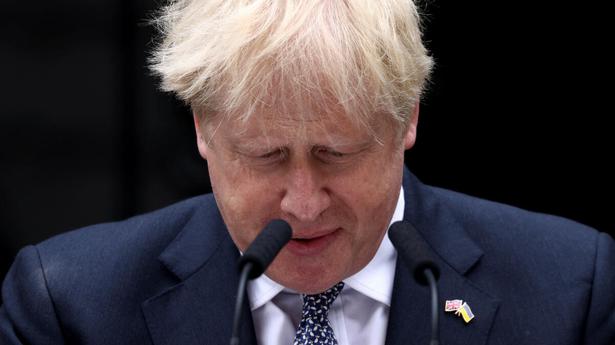
Boris Johnson defends leaving cost-of-living crisis to new Prime Minister of United Kingdom
The Hindu
Addressing a Downing Street reception on August 9, Boris Johnson said he was "absolutely certain" his successor would do more to help people with rising fuel bills.
Outgoing British Prime Minister Boris Johnson has defended leaving his successor, either former Chancellor Rishi Sunak or Foreign Secretary Liz Truss, to deal with the soaring inflation and cost-of-living crisis, saying he is confident the government will have the fiscal firepower and the headroom to look after people.
Addressing a Downing Street reception on Tuesday evening (August 9), Mr. Johnson said he was "absolutely certain" his successor would do more to help people with rising fuel bills. It came as Downing Street had ruled out any fresh government spending commitments during Mr. Johnson's remaining time in office, despite pressure from Opposition parties.
"Whoever he or she may be, they, I'm absolutely certain, will be wanting to make some more announcements in September, October about what we're going to do further in the next period, in December, January,” Mr. Johnson said, with reference to the finalists in the Conservative Party leadership race – Rishi Sunak and Liz Truss.
"I just want you to know that I'm absolutely confident we will have the fiscal firepower and the headroom to look after people as we've done throughout," he said.
While Ms. Truss has promised immediate tax cuts, her rival Mr. Sunak has vowed targeted support to provide more money to vulnerable households if elected early next month.
But the Opposition Labour Party accused the Conservative government of leaving a "political vacuum" and called on Mr. Johnson and the Prime Ministerial hopefuls not to wait but to act now.
"There is a lot that we need to do, but at the moment what we have got is bickering in the Conservative party, a race to the bottom amongst the candidates, an absent Prime Minister nowhere to be seen,” David Lammy, Labour’s Shadow Foreign Secretary, told the BBC.

“Writing, in general, is a very solitary process,” says Yauvanika Chopra, Associate Director at The New India Foundation (NIF), which, earlier this year, announced the 12th edition of its NIF Book Fellowships for research and scholarship about Indian history after Independence. While authors, in general, are built for it, it can still get very lonely, says Chopra, pointing out that the fellowship’s community support is as valuable as the monetary benefits it offers. “There is a solid community of NIF fellows, trustees, language experts, jury members, all of whom are incredibly competent,” she says. “They really help make authors feel supported from manuscript to publication, so you never feel like you’re struggling through isolation.”

Several principals of government and private schools in Delhi on Tuesday said the Directorate of Education (DoE) circular from a day earlier, directing schools to conduct classes in ‘hybrid’ mode, had caused confusion regarding day-to-day operations as they did not know how many students would return to school from Wednesday and how would teachers instruct in two modes — online and in person — at once. The DoE circular on Monday had also stated that the option to “exercise online mode of education, wherever available, shall vest with the students and their guardians”. Several schoolteachers also expressed confusion regarding the DoE order. A government schoolteacher said he was unsure of how to cope with the resumption of physical classes, given that the order directing government offices to ensure that 50% of the employees work from home is still in place. On Monday, the Commission for Air Quality Management in the National Capital Region and Adjoining Areas (CAQM) had, on the orders of the Supreme Court, directed schools in Delhi-NCR to shift classes to the hybrid mode, following which the DoE had issued the circular. The court had urged the Centre’s pollution watchdog to consider restarting physical classes due to many students missing out on the mid-day meals and lacking the necessary means to attend classes online. The CAQM had, on November 20, asked schools in Delhi-NCR to shift to the online mode of teaching.









